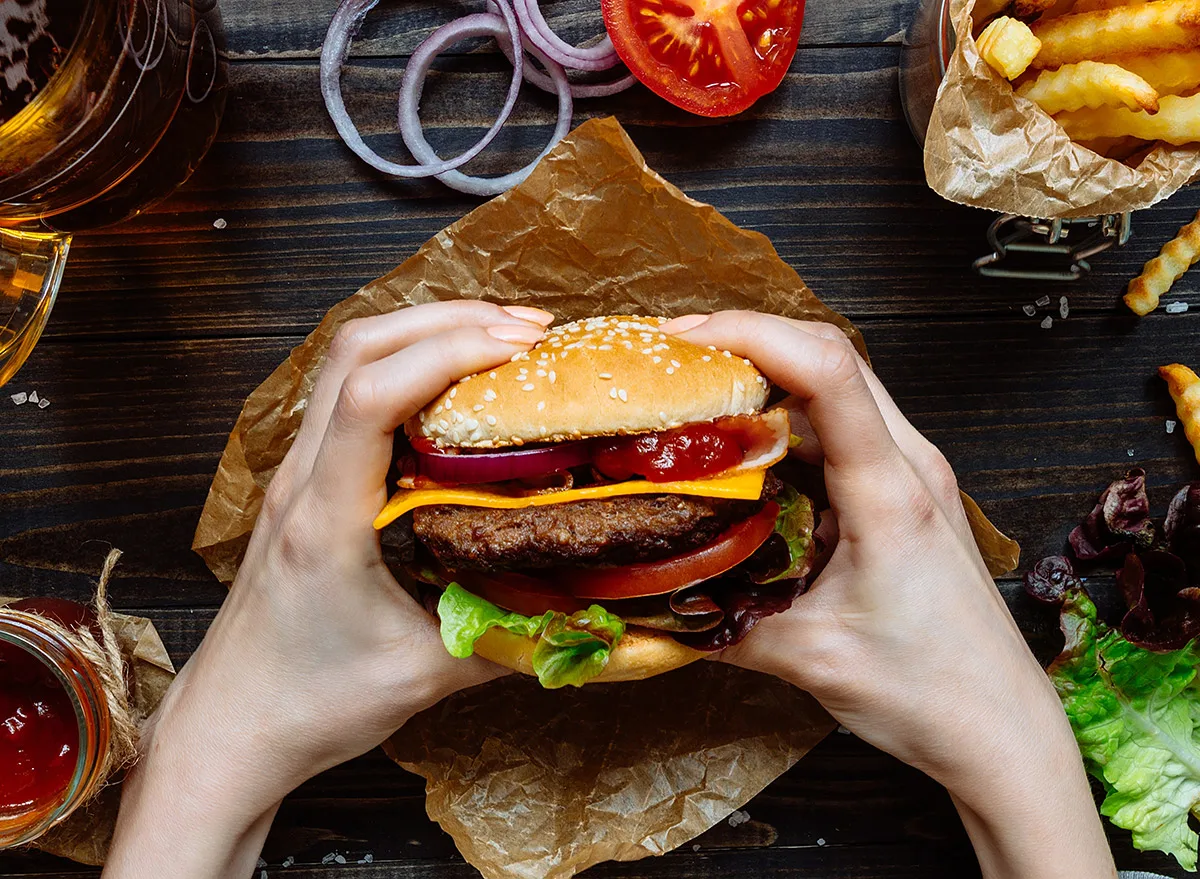At its core, mindful eating is about being present and fully engaged in the experience of eating. It’s about paying attention to what we’re consuming, how we’re consuming it, and how our bodies are responding to it.
Definition of Mindful Eating
Mindful eating is a practice that involves bringing one’s full attention and awareness to the act of eating. It means being fully present in the moment, without distractions or judgment, as we consume our food.
This type of eating requires us to slow down and savor each bite, to pay attention to the flavors and textures of our food, and to tune in to our hunger and fullness cues. It also involves being mindful of our emotions and thoughts as they relate to food.
Importance of Mindful Eating in Maintaining a Healthy Lifestyle
In today’s fast-paced world, it’s all too easy for us to fall into mindless eating habits. We may eat while distracted by work or screens or rush through meals without taking time to appreciate them. However, research has shown that practicing mindful eating can have numerous health benefits.
For one thing, it can reduce overeating by helping us tune into our body’s internal cues for hunger and fullness. This can lead to healthier weight management over time.
In addition, mindful eating has been shown to improve digestion by slowing down the pace at which we eat. By chewing more slowly and deliberately, we give our stomachs more time to process food properly.
Overall, practicing mindful eating can promote a healthier relationship with food by encouraging us to be more intentional about what we eat and how we eat it. In turn, this can lead us towards a more balanced lifestyle that supports greater well-being both physically and mentally.
Overview of Mindful Eating
Mindful eating is a practice that encourages a more intentional and present approach to eating. It involves paying attention to the sensations, thoughts, and emotions that arise while eating without any judgment. By cultivating awareness around our food choices and eating habits, we can develop a healthier relationship with food and improve our overall well-being.
Understanding the concept of mindfulness
Mindfulness is the act of being present in the moment without judgment. It’s about bringing your full attention to what you’re doing right now, whether it be eating, breathing, or any other activity. In terms of food choices and eating habits, mindfulness involves fully engaging with all aspects of the experience: from selecting ingredients to savoring each bite.
How mindfulness can be applied to eating habits
Mindfulness can be applied to many aspects of our daily lives – including how we eat. By practicing mindfulness during meals, we can become more aware of our bodies’ hunger and fullness signals as well as our emotions surrounding food.
This awareness allows us to make conscious decisions about what we eat rather than mindlessly consuming whatever is in front of us. Some techniques for applying mindfulness include taking time to appreciate the visual appeal and aroma of your food before taking a bite; chewing slowly and fully experiencing the flavors and textures; and focusing on how your body feels throughout the meal.
Benefits of mindful eating
There are numerous benefits associated with practicing mindful eating. One such benefit is improved digestion: when we chew more slowly and thoroughly, we give our digestive system time to properly process our food which can reduce bloating, gas, and discomfort.
Mindful eating has also been linked with weight management. By paying attention to hunger cues instead of relying on external factors like portion sizes or social pressures around finishing everything on your plate, you may find that you naturally eat less overall.
Mindful eating promotes a healthier relationship with food by reducing feelings of guilt or shame around eating “bad” foods. Rather than labeling certain foods as “good” or “bad,” we can learn to enjoy everything in moderation and appreciate the full experience of eating.
The Mind-Body Connection in Eating Habits
Understanding the connection between emotions and food choices
Food is not just a source of energy for our bodies; it is also closely linked to our emotions. We often turn to food, whether consciously or subconsciously, as a way of coping with stress, anxiety or other negative emotions.
Have you ever found yourself reaching for your favorite comfort food after a long day at work? That’s because certain foods can trigger the release of neurotransmitters like serotonin and dopamine – chemicals that make us feel happy and calm.
However, this emotional eating can lead to unhealthy habits and weight gain. It’s important to be mindful of what we are eating and why we are choosing certain foods.
Are we truly hungry or just trying to fill an emotional void? By being aware of our emotional triggers, we can start to break the cycle of emotional eating and make healthier choices.
How stress and anxiety can affect our eating habits
Stress is a common trigger for overeating. When we are stressed, our body releases cortisol, which increases appetite. In addition, stress can also lead to poor sleep quality which further impacts our appetite hormones.
This combination often leads us reaching out for sugary snacks or comfort foods as they provide temporary relief from stress. On the other hand, anxiety may lead us towards skipping meals entirely or overthinking about what we should be eating thereby shifting focus on quantity rather than quality leading us towards unhealthy options again.
Techniques for managing emotional eating
The good news is that there are several techniques that you can use to manage your emotional eating habits: 1) Mindfulness meditation: Meditation has been shown to help reduce stress levels by focusing on your breathing technique especially when you feel an urge to eat emotionally.
2) Identifying triggers: Keep a food journal where you can record your emotional state and food intake. This will help you identify patterns and triggers that lead to emotional eating.
3) Find alternative coping mechanisms: Instead of turning to food in times of stress, find other ways to cope such as reading a book, taking a walk or calling a friend. By recognizing the link between our emotions and eating habits, we can take steps towards making more mindful food choices and improving our overall health.
Mindful Eating Practices
Slow and deliberate chewing
One of the most important mindful eating practices is to chew food slowly and deliberately. This allows us to savor the flavors, textures, and aroma of our food while also helping us to feel more satisfied with smaller portions.
Chewing slowly also aids in digestion by breaking down food into smaller particles that are easier for the body to absorb. To practice this technique, take small bites of food and chew each bite 20-30 times before swallowing.
It may take some time to get used to this slower pace, but over time it will become a habit that greatly enhances your enjoyment of meals. You will find yourself paying closer attention to the flavors and textures of each bite, leading you to appreciate your meals even more.
Paying attention to hunger and fullness cues
Another essential aspect of mindful eating is tuning in with your body’s hunger and fullness signals. Eating when you are truly hungry and stopping when you are satisfied will help prevent overeating, which can lead to weight gain or other negative health consequences.
To practice this technique, take a moment before each meal or snack to assess your level of hunger on a scale from 1-10 (1 being extremely hungry, 10 being completely full).
During the meal or snack, periodically check in with yourself about how full you feel. Stop eating when you reach a comfortable level of fullness (around a 6 on the hunger scale), even if there is still food left on your plate.
Savoring food flavors and textures
Savoring the flavors and textures of your food is an important way to enhance the experience of mindful eating. Mindful eaters pay close attention not only to what they are eating but how it tastes and feels in their mouth as well. Take time during meals or snacks to truly savor each bite.
Notice the different flavors and textures of your food, and how they change as you chew. Consider the temperature, spiciness, sweetness, or bitterness of your food.
Try to identify specific ingredients or seasonings that contribute to its overall taste. Paying close attention to these details will help you enjoy your food more fully and appreciate its complexity.
Mindful Meal Planning
Mindful meal planning involves taking the time to plan and prepare meals that are both healthy and satisfying. Planning ahead can help you avoid making unhealthy food choices when you’re short on time or feeling stressed.
By creating a meal plan, you can also ensure that you’re getting all of the nutrients your body needs to function optimally. Choosing nutrient-dense foods is essential for optimal health, as they provide essential vitamins and minerals that your body needs to function properly.
These foods include fruits, vegetables, whole grains, lean proteins, and healthy fats. When planning meals, try to incorporate a variety of these foods for optimal nutrition.
Incorporating variety in meal planning is also important to keep your taste buds stimulated and prevent boredom with your food choices. You can try new recipes or experiment with different spices and seasonings to add flavor without adding excess calories or unhealthy ingredients.
Mindful Eating Tips for Different Situations
Social gatherings, parties, and restaurants
Social events can be challenging for mindful eaters as there are often tempting high-calorie foods available in large quantities. It’s important to remember that it’s okay to indulge occasionally but do so mindfully by paying attention to hunger cues and eating slowly so that you can savor each bite.
When dining out at restaurants or attending social gatherings with food, try looking at the menu ahead of time so you can make an informed decision about what you’ll order. Look for healthier options such as grilled vegetables or lean protein dishes rather than fried or high-fat options.
Traveling, work lunches, and snacks on-the-go
Traveling or eating on-the-go doesn’t mean sacrificing mindful eating habits. Bringing healthy snacks like fruit, nuts, or cut-up veggies with you can help you avoid the temptation of unhealthy snacks. When eating out on work lunches, try to choose salads with lean protein or grilled chicken instead of fried or heavy sandwiches.
When traveling, research restaurants ahead of time so that you can make informed choices. Additionally, packing healthy snacks and meals for the journey can help avoid any temptations to eat unhealthy airport or rest stop food.
Common Misconceptions about Mindful Eating
Myth #1 – It’s too time-consuming
Mindful eating doesn’t necessarily involve spending more time preparing food or eating. In fact, by being more present while we eat we may find that we are more satisfied with less food and spend less time snacking throughout the day.
Myth #2 – You have to give up your favorite foods
Mindful eating is not about deprivation or restricting yourself from enjoying your favorite foods. Rather it’s about being present and savoring every bite while also making an effort to choose healthier options when possible.
Myth #3 – It’s only for people with weight issues
Mindful eating is beneficial for anyone looking to improve their overall health and well-being- not just those who need to lose weight. By being more present while we eat and choosing nutrient-dense foods over high-calorie options we can all benefit from mindful eating practices.
Conclusion
Mindful eating is a practice that can be easily incorporated into everyday life. By taking the time to plan meals ahead of time, making healthy choices in different situations, and dispelling common misconceptions about mindful eating- anyone can adopt this practice and enjoy its many benefits.
The process of being more present while eating allows us to savor every bite, enjoy the flavors, and appreciate the nourishment that our food provides. Ultimately, mindful eating can help us feel more satisfied with less food and improve our overall well-being.
Quotes on mindfulness that can be applied mindful eating.
- “When walking, walk. When eating, eat.” – Zen Proverb
- “The mind and body are not separate. What affects one, affects the other.” – Anonymous
- “In this moment, there is plenty of time. In this moment, you are precisely as you should be. In this moment, there is infinite possibility.” – Victoria Moran
- “The food you eat can be either the safest and most powerful form of medicine or the slowest form of poison.” – Ann Wigmore
- “Eating is not merely a material pleasure. Eating well gives a spectacular joy to life and contributes immensely to goodwill and happy companionship.” – Elsa Schiaparelli
- “He who takes medicine and neglects to diet wastes the skill of his doctors.” – Chinese Proverb
- “When diet is wrong, medicine is of no use. When diet is correct, medicine is of no need.” – Ayurvedic Proverb
- “One should eat to live, not live to eat.” – Moliere
- “Your body is a temple, but only if you treat it as one.” – Astrid Alauda
- “To eat is a necessity, but to eat intelligently is an art.” – François de la Rochefoucauld
- “Mindful eating is about awareness. When you eat mindfully, you slow down, pay attention to the food you’re eating, and savor every bite.” – Susan Albers
- “Mindfulness is about being fully awake in our lives. It is about perceiving the exquisite vividness of each moment.” – Jon Kabat-Zinn
- “The secret of health for both mind and body is not to mourn for the past, worry about the future, or anticipate troubles, but to live in the present moment wisely and earnestly.” – Buddha
- “The only way to live is by accepting each minute as an unrepeatable miracle.” – Tara Brach
- “The best way to capture moments is to pay attention. This is how we cultivate mindfulness.” – Jon Kabat-Zinn
- “The greatest wealth is health.” – Virgil
- “Let food be thy medicine and medicine be thy food.” – Hippocrates
- “It’s not food if it arrived through the window of your car.” – Michael Pollan
- “Eat food. Not too much. Mostly plants.” – Michael Pollan
- “When you have your health, you have everything. When you do not have your health, nothing else matters at all.” – Augusten Burroughs
These quotes emphasize the importance of mindfulness, healthy eating habits, and the profound connection between our food and overall health.
20 mindful eating affirmations:
- “I respect my body and nourish it with healthy food.”
- “I am aware of the sensations of eating and savoring each bite.”
- “I enjoy each moment of my meal, fully focusing on the flavors.”
- “I listen to my body’s signals to know when I am full.”
- “I eat to fuel my body, not to feed my emotions.”
- “I am in control of my eating habits.”
- “I honor my body by eating mindfully and healthily.”
- “I am grateful for the food that nourishes my body and mind.”
- “I take time to enjoy and appreciate the food I eat.”
- “I eat slowly, taking time to chew and taste every bite.”
- “Eating mindfully is a form of self-care and I deserve it.”
- “I choose foods that promote my health and wellbeing.”
- “I am mindful of the quantity and quality of the food I eat.”
- “My body deserves the best nutrition I can provide.”
- “I release all feelings of guilt associated with food.”
- “I am present with every bite, enjoying the nourishment it brings.”
- “I make healthy and mindful choices about the foods I consume.”
- “I feel satisfied and content with smaller portions.”
- “I acknowledge the effort and resources that brought this food to my plate.”
- “I am learning to differentiate between physical hunger and emotional hunger.”
Please remember that affirmations are a tool that can help shift your mindset, but it’s also important to combine them with other practices, such as healthy eating habits, regular exercise, and, if needed, professional guidance.




























































